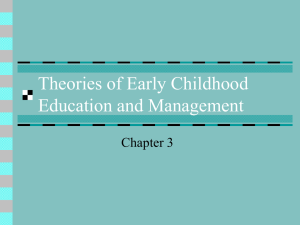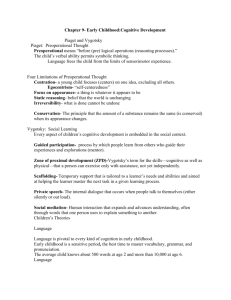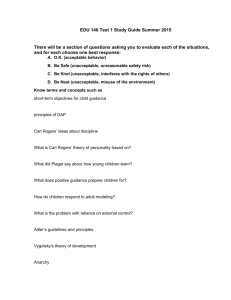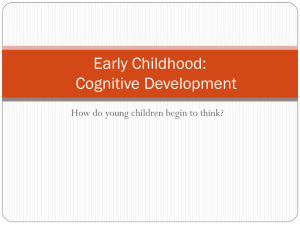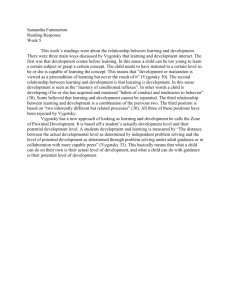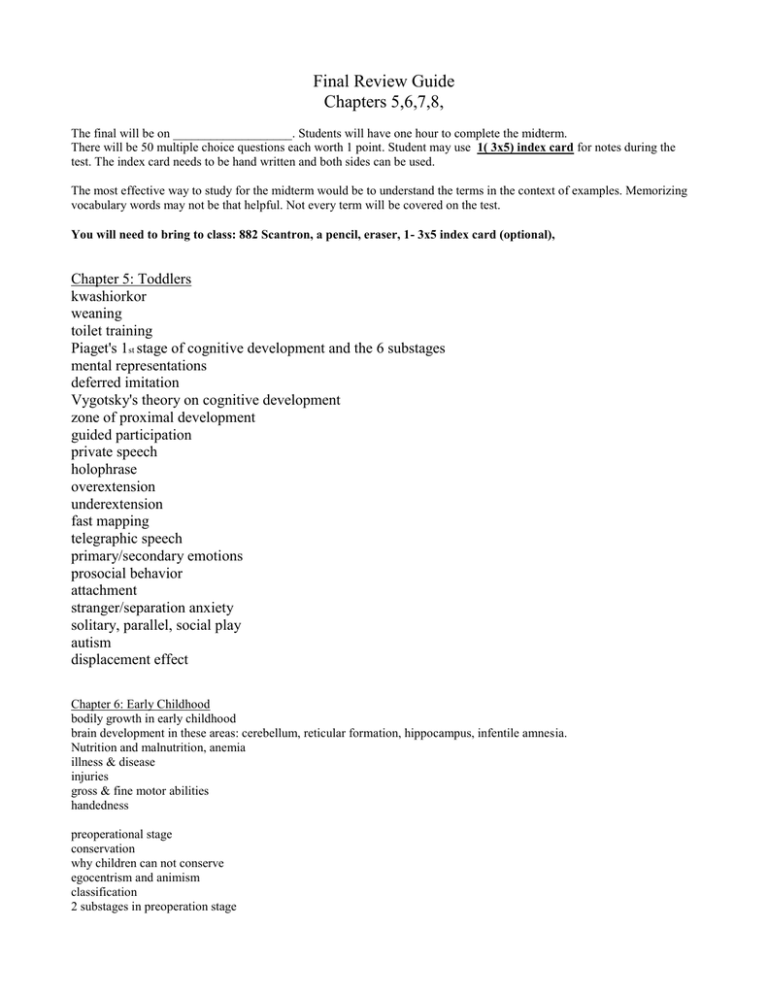
Final Review Guide
Chapters 5,6,7,8,
The final will be on ___________________. Students will have one hour to complete the midterm.
There will be 50 multiple choice questions each worth 1 point. Student may use 1( 3x5) index card for notes during the
test. The index card needs to be hand written and both sides can be used.
The most effective way to study for the midterm would be to understand the terms in the context of examples. Memorizing
vocabulary words may not be that helpful. Not every term will be covered on the test.
You will need to bring to class: 882 Scantron, a pencil, eraser, 1- 3x5 index card (optional),
Chapter 5: Toddlers
kwashiorkor
weaning
toilet training
Piaget's 1st stage of cognitive development and the 6 substages
mental representations
deferred imitation
Vygotsky's theory on cognitive development
zone of proximal development
guided participation
private speech
holophrase
overextension
underextension
fast mapping
telegraphic speech
primary/secondary emotions
prosocial behavior
attachment
stranger/separation anxiety
solitary, parallel, social play
autism
displacement effect
Chapter 6: Early Childhood
bodily growth in early childhood
brain development in these areas: cerebellum, reticular formation, hippocampus, infentile amnesia.
Nutrition and malnutrition, anemia
illness & disease
injuries
gross & fine motor abilities
handedness
preoperational stage
conservation
why children can not conserve
egocentrism and animism
classification
2 substages in preoperation stage
Vygotsky's cultural learning. What type of cultural learning takes place in early childhood?
Features of preschool quality pg 255
grammar/prgamatics
emotional self regulation
undercontrol
externalizing/internalizing problems
over control
Initiative vs. guilt stage
gender constancy
gender roles
gender schema
autoritative/ autoritarian/permissive/disengaged parenting styles
insrumental/hostile/realtional agression
Chapter 7: Middle Childhood
Body mass index
Overweight /obese
Asthma
Gross & fine motor advancements
Concrete operations
Decentering
Seriation
Transitive inference
ADHD
Intelligence/ intelligence tests
Mental retardation/gifted
Theory of multiple intelligence
Bilingual/multilingual
ESM experience sampling method
Ambivalence
Self –concept/self esteem/social comparison
Coregulation
Stepfamily
Family process
Social skills
Industry vs. inferiority
Media multitasking
Chapter 8: Adolescence
puberty
menarche/spermarche
primary/secondary sex characteristics
brain development
secular trend
anorexia/bulimia
reasons for substance use
formal operations
hypothetical-deductive reasoning
adolescent egocentrism/imaginary audience
Vygotsky's cultural learning. What type of cultural learning takes place during adolescence?
Adolescent work/schooling
storm and stress
actual/possible/ideal/feared/false self
autonomy/conflict with parents
peers and friends
intimacy
clique/crowd
bullying/cyberbullying
love & sex
homophobia
crime and delinquency
electronic use
depression
resiliency/protective factors

